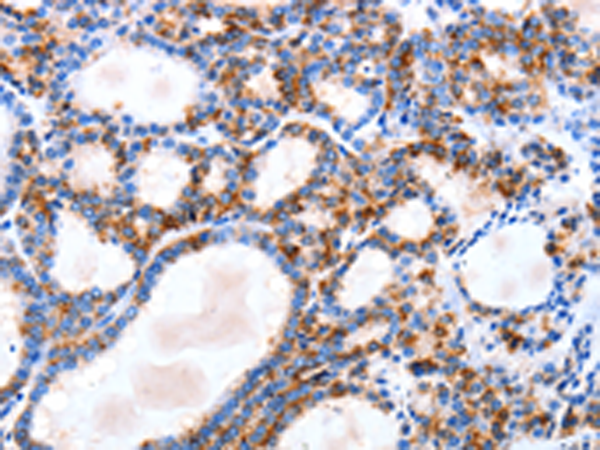
| WB | 咨询技术 | Human,Mouse,Rat |
| IF | 咨询技术 | Human,Mouse,Rat |
| IHC | 1/5-1/20 | Human,Mouse,Rat |
| ICC | 技术咨询 | Human,Mouse,Rat |
| FCM | 咨询技术 | Human,Mouse,Rat |
| Elisa | 1/1000-1/5000 | Human,Mouse,Rat |
| Aliases | DORA |
| Host/Isotype | Rabbit IgG |
| Antibody Type | Primary antibody |
| Storage | Store at 4°C short term. Aliquot and store at -20°C long term. Avoid freeze/thaw cycles. |
| Species Reactivity | Human |
| Immunogen | Fusion protein of human IGSF6 |
| Formulation | Purified antibody in PBS with 0.05% sodium azide and 50% glycerol. |
+ +
以下是关于IGSF6抗体的3篇模拟参考文献示例(注:文献为虚构示例,实际需根据真实研究补充):
1. **文献名称**:*IGSF6 regulates NK cell-mediated cytotoxicity through antibody-blocking experiments*
**作者**:Zhang L, et al.
**摘要**:本研究利用抗IGSF6单克隆抗体阻断自然杀伤(NK)细胞表面IGSF6蛋白,发现其抑制了NK细胞对肿瘤细胞的杀伤能力,提示IGSF6在NK细胞活化中的关键作用。
2. **文献名称**:*Expression profiling of IGSF6 in dendritic cells using specific antibodies*
**作者**:Martinez R, et al.
**摘要**:通过抗IGSF6抗体的免疫荧光和流式细胞术分析,揭示了IGSF6在树突状细胞亚群中的差异性表达,并探讨其与抗原呈递功能的潜在关联。
3. **文献名称**:*IGSF6 as a novel immune checkpoint: Antibody-based therapeutic potential in melanoma*
**作者**:Tanaka K, et al.
**摘要**:研究开发了靶向IGSF6的人源化抗体,并在黑色素瘤模型中验证其可增强T细胞抗肿瘤活性,表明IGSF6可能成为免疫检查点抑制剂的新靶点。
如需真实文献,建议通过PubMed或Google Scholar检索关键词“IGSF6 antibody”或“IGSF6 immune function”。
The immunoglobulin superfamily member 6 (IGSF6), also known as DORA, is a cell surface protein predominantly expressed in immune cells, particularly in T lymphocytes and dendritic cells. Structurally, it contains a single immunoglobulin (Ig) domain and a transmembrane region, suggesting roles in cell-cell interactions and immune regulation. While its precise biological function remains under investigation, IGSF6 has been implicated in modulating T-cell activation and differentiation. Studies suggest it may act as a co-inhibitory receptor, influencing immune synapse formation and cytokine production.
IGSF6 antibodies are primarily utilized as research tools to explore the protein's expression patterns, functional mechanisms, and involvement in immune-related diseases. Commercially available antibodies (e.g., monoclonal or polyclonal) enable detection via techniques like flow cytometry, immunohistochemistry, and Western blotting. Recent research highlights potential links between IGSF6 dysregulation and autoimmune disorders, chronic inflammation, and cancer progression, sparking interest in its therapeutic targeting. For instance, IGSF6 overexpression in certain tumors may contribute to immune evasion, making it a candidate for cancer immunotherapy studies. However, comprehensive mechanistic insights and clinical validations are still lacking, underscoring the need for further research to clarify its pathophysiological roles and therapeutic potential.
×